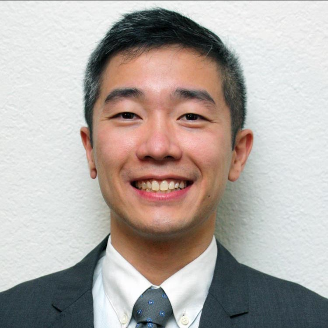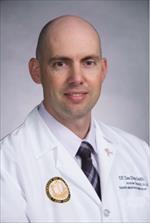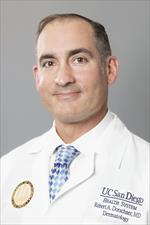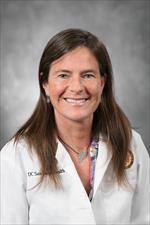Funding and Support
- KL2 and SUSTAIN Programs
- Pilot Project Awards
- Galvanizing Engineering in Medicine Awards
- MedGap Program
- Terms and Conditions for Support
The ACTRI KL2 Grant Support program is an institutional equivalent of a K23, K01 or K08 award, a research training grant for junior faculty, provides up to three years of research career development support and up to $120,000 for UC San Diego instructors or assistant professors.
 Fanny Chapelin, PhD
Fanny Chapelin, PhD
Departments of Bioengineering and Radiology
Mentors: Rebecca Rakow-Penner, MD, PhD and Elliott McVeigh, PhD
Project title: MR imaging of tumor associated macrophage changes with therapy
Abstract: Tumor associated macrophage (TAM) infiltration in tumors is an established biomarker of tumor aggressiveness and resistance to therapy. To assay immune infiltrates in tissue, one generally relies on tissue biopsy, which is invasive and only provides a crude sampling of the tumor. Magnetic resonance imaging (MRI)-based cell tracking techniques have proven successful in monitoring immune cell migration to foci of inflammation in cancer. We propose to develop non-invasive MRI imaging methods in murine cancer models that could serve as prognostic biomarkers of therapy efficacy or tumor recurrence. In Aim 1, we will develop an MR imaging platform to track macrophage recruitment following immunotherapy to serve as biomarker of immunotherapy efficacy. In Aim 2, we will establish that macrophage recruitment following radiation therapy is an early indicator of tumor recurrence, as evidenced by non-invasive MRI. The ultimate goal is the translation of this diagnostic tool from bench to bedside. This will enable evaluation by clinicians of patients most likely to relapse following radiation therapy and those likely to respond positively to PD-1 immunotherapy.
 Winta Mehtsun, MD, MPH
Winta Mehtsun, MD, MPH
Department of Surgery, Division of Surgical Oncology
Mentor: Samir Gupta, MD, MSCS, AGAF
Project Title: Disparities in Colorectal Cancer Care Quality and Outcomes Across Rural and Urban Populations in the United States
Abstract: Long-standing disparities in access and health outcomes persist for rural patients with cancer. Rural residents exhibit higher cancer incidence and deaths for cancers that can be prevented and/or detected early through screening, such as colorectal cancer (CRC), which is a commonly diagnosed cancer, a leading cause of cancer-specific mortality, and requires multimodal treatment. Critical access hospitals, play a key role in providing cancer screening and treatment for U.S. rural populations. Nevertheless, the quality and extent of cancer care provided in critical access hospitals in the United States—and how care compares to non-critical access hospitals—is poorly described, despite the key role they play in serving rural communities. Against this backdrop, the proposed KL2 project will assess guideline-concordant care for CRC nationally. Using Surveillance, Epidemiology, and End Results (SEER) Medicare data we will examine rates of guideline-concordant care among rural and urban patients aged 65 years and older, diagnosed with CRC between 2010 and 2017. This national quantitative analysis will be supplemented with qualitative interviews conducted in California rural hospitals. The proposed analysis also will be supplemented by a comprehensive training and mentorship plan, which will enable the applicant to (1) increase skills in advanced statistical analysis, quantitative health policy analysis, and expertise with longitudinal administrative data, (2) develop a foundation in mixed-methods research, (3) increase expertise with models addressing rural health disparities, and (4) advance overall career development goals. Understanding effective strategies to reduce care disparities will ensure that all Americans receive equitable CRC care, regardless of geography.
 Shanshan Wang, MBBS, PhD
Shanshan Wang, MBBS, PhD
Department of Anesthesiology
Mentor: Mark Tuszynski, MD, PhD
Project Title: Combination of Neurotrophin and Neural Progenitor Cell Transplantation to Promote Corticospinal Axonal Regeneration After Spinal Cord Injury
Abstract: Spinal cord injury (SCI) results in permanent loss of function including mobility, sensation, and autonomic control due to the absence of spontaneous regeneration within the adult central nervous system (CNS). Although prior studies focused on the growth-inhibitory role of the environment after injury, it is now clear that injured axons fail to regrow largely because mature adult CNS neurons lack the intrinsic capacity to regenerate. Our preliminary study found that the combination of PTEN/SOCS3 deletion in host motor neurons with neural progenitor cell grafts in lesion sites robustly improved corticospinal regeneration compared to either intervention alone. However, sustained inhibition of PTEN/SOCS3 (tumor suppressor genes) could result in cancer. Thus, we propose an alternative strategy which use neurotrophic factors BDNF and CNTF to engage the same pro-regenerative signaling pathways as PTEN/SOCS3 deletion. We will combine BDNF/CNTF gene therapy with neural stem cell graft at the injury site to promote the formation of neural relays across the lesion and improve functional outcomes. In addition, we will investigate the innovative “Xon” system for drug-inducible BDNF/CNTF expression. Findings from this study could identify an innovative candidate preclinical therapy for SCI that combines the proven regenerative efficacy of both neurotrophic gene therapy and neural stem cell transplantation.
 Clarkson Crane, MD
Clarkson Crane, MD
Department of Pediatrics, Division of Pediatric Nephrology
Mentor: Gerald Morris, MD, PhD
Project Title: Development of a donor-specific cellular biomarker to inform personalized immunosuppression in kidney transplant recipients
Abstract: Kidney transplantation is the most effective treatment strategy for end stage kidney disease. Although physicians successfully performed solid organ transplants starting nearly seven decades ago, almost all kidney recipients will experience a degree of rejection in their allograft. A fundamental challenge in transplantation is achieving balance between suppressing the alloreactivity of a recipient’s adaptive immune system while preserving functional immune responses against infection and malignancy. Alloreactivity of a recipient against dissimilar donor Human Leukocyte Antigen (HLA) is the basis for rejection. While antibodies to donor specific HLA are measured in regular clinical practice, there is no routine assessment of T cell reactivity. Our central hypothesis is that prediction and measurement of T cell responses to donor-specific HLA can provide prognostic information to better risk stratify kidney transplant recipients compared to the current standard of care. The initial aim of this proposal seeks to validate (and ultimately improve) algorithmic prediction of T cell responses against the donor kidney by measuring ex vivo differences in T cell alloreactivity. This work will lay the foundation for the second aim of this proposal, which will measure functional and computational alloreactivity of immunodominant antigens and apply this prospectively with longitudinal samples from kidney transplant patients. Successful completion of this work will provide a mechanistic foundation for prospective clinical trials testing the implementation of a donor-specific and biomarker-based personalized medicine approach to immunosuppression regimens. This works toward an ultimate goal to prolong graft longevity through earlier detection of rejection and minimizing long-term adverse effects of immunosuppression.
 Patricia Riggs, DO
Patricia Riggs, DO
Department of Medicine, Division of Infectious Diseases and Global Public Health
Mentor: Scott Letendre, MD
Project Title: Comprehensive Viral Antibody Signatures and Central Nervous System Phenotypes in People with HIV
Abstract: Neuropsychiatric complications remain a significant problem for people with HIV (PWH), even when the virus is controlled with antiretroviral therapy. These complications are heterogeneous and currently lack effective treatments. While viral co-infections are often associated with neuropsychiatric conditions, they are understudied. Most existing research focuses on individual viral infections, yet many viruses interact to shape the host immune system, likely contributing to the variability in immune profiles and neuropsychiatric complications.
The UCSD ACTRI KL2 award will support Dr. Riggs’s career development toward research independence by supporting both key training goals and scientific aims. The project will leverage over two decades of NIMH-supported CHARTER cohort data and an ongoing R01 study that employs machine learning to identify novel neuropsychiatric biotypes based on high-dimensional neurobehavioral, neuromedical, and immunological data. This award specifically supports the investigation of viral co-infections using an innovative high-throughput assay (VirScan Phage Immunoprecipitation Sequencing), which detects antibodies to over 106,000 viral epitopes from more than 200 human viruses. VirScan will be applied to existing paired blood and cerebrospinal fluid specimens from 200 well characterized participants and analyzed using dimension reduction and machine learning methods. These findings will be compared to proteomics (Aim 1) and neurocognitive (Aim 2) data that will be provided by the CHARTER resource. The study will also place a strong emphasis on sex as a biological variable (Aim 3). By identifying the complex interactions between sex, immune responses to the human virome, and neurocognitive profiles in PWH, this research aims to generate novel mechanistic insights with high potential for clinical translation, including the development of targeted therapeutics such as antivirals, vaccines, and immunomodulatory treatments. The findings will inform the development of future R01 grant applications and lay the foundation for Dr. Riggs’s long-term goal of becoming an independently funded investigator leading a multidisciplinary translational research team applying the precision medicine framework to neuropsychiatric complications of virally mediated immune dysregulation to develop targeted treatments.

Katherine Longardner, MD
Department of Neurosciences - Division of Movement Disorders
Mentor: Irene Litvan, MD, MSc, FAAN, FANA
Project Title: Effects of Blood Pressure on Cognition and Cerebral Oxygenation in Parkinson Disease
Abstract: Orthostatic hypotension (OH) is associated with worse cognition in Parkinson disease (PD) and could be a treatable risk factor for cognitive dysfunction. However, the mechanisms of this association remain unclear, and no treatment guidelines exist for asymptomatic OH. PD causes cognitive impairment and cardiovascular autonomic failure manifesting as OH (low blood pressure (BP) when upright). The overall objective of this research is to determine how OH affects transient, positional cognitive changes and brain blood flow in PD. In cross-sectional experiments, participants with PD with and without OH will undergo repeated cognitive testing while sitting and while upright on a tilt table. During cognitive testing, BP will be measured continuously and simultaneously with brain perfusion using functional near-infrared spectroscopy. Aim 1will determine the relationship between BP and cognition and how cognition differs between participants with and without OH. Aim 2will determine how brain perfusion relates to cognition and BP. This study will utilize innovative technology to yield novel data that will be used in future projects to determine clinically relevant BP thresholds. This research has potential significance because it can advance knowledge toward developing OH treatment targets, with the long-term objective of preventing cognitive dysfunction in PD. I am a movement disorders neurologist with clinical and research experience in PD. My training plan will support my acquisition of skills and knowledge in autonomic failure, PD-related cognitive impairment, functional neuroimaging, and advanced statistical methods toward becoming an independent clinician-scientist focusing on how cardiovascular dysautonomia relates to preventable cognitive impairment.

Kentson Lam, MD, PhD
Department of Medicine - Division of Regenerative Medicine
Mentor: Robert A.J. Signer, PhD
Project Title: Targeting the protein homeostasis network in acute myeloid leukemia
Abstract: Acute myeloid leukemia (AML) is the most common form of adult acute leukemia. Standard treatment remains induction chemotherapy and the five-year survival rate is just 29%. Thus, identifying new strategies to target AML has immense clinical significance. The proteostasis network collectively refers to how the proteome is regulated. Our lab showed that hematopoietic stem cell function depends on balancing proteostasis. Stem cells depend on unusually low protein synthesis rates to minimize biogenesis of misfolded proteins. Proteostasis regulation in AML has not been thoroughly examined. Two nodes of proteostasis include protein degradation, which consists of the proteasome and autophagy, and proteotoxic stress pathways like the heat shock response, which is mediated by the transcription factor HSF1. Proteasome inhibitors have largely been ineffective in AML. One reason may be that there are compensatory responses in other nodes of the proteostasis network. I generated preliminary data showing that there is significant crosstalk between the proteasome and autophagy, and combined inhibition of these pathways disrupts proteostasis and decreases human AML cell viability. In addition, I found that HSF1 is activated in human AML cells in response to proteasome inhibition, raising the possibility that it may enable AML cells to cope with this treatment. My central hypothesis is that disrupting proteostasis can impair AML development and progression. In Aim 1, I will determine if combined proteasome and autophagy inhibition disrupts proteostasis and impairs AML progression. In Aim 2, I will determine if HSF1 promotes AML development and restricts the therapeutic efficacy of proteasome inhibition.

Jacqueline Greene, MD
Department of Head & Neck Surgery – Otolaryngology
Mentor: Mark Tuszynski MD/PhD, Joseph Califano, MD
Project Title: Advancing Long-Gap Facial Nerve Regeneration with 3D-Printed Multichannel Nerve Scaffolds
Abstract: There are limited repair options for long-gap peripheral nerve defects and peripheral nerve regeneration over long distances remains poorly understood. There are an estimated 500,000 cases of peripheral nerve transection requiring repair annually and peripheral nerve injuries cost the US healthcare system $150 billion annually; however functional outcomes for long-gap repair are often suboptimal. Currently, the only means of repairing lengthy and branched facial nerve defects (often 15cm or more) in patients with Head and Neck tumors is autologous nerve grafting (autografting) which is technically challenging, creates additional surgical site morbidity, prolongs anesthesia time and raises the risk of post-operative complications; only 24% of patients whose facial nerves are resected during parotid tumor excision receive nerve repair. Patients who do not receive facial nerve repair, or fail to recover, are left with significant long-term functional deficits from facial paralysis. Advances in 3D printing technology have led to the development of a 3D-printed scaffold with microscale multichannel architecture that is rapidly colonized by host Schwann cells and has demonstrated linear axonal topographic guidance up to 3 cm gaps in the rabbit sciatic nerve. A comprehensive investigation of the 3D-printed multichannel scaffold in a long-gap facial nerve repair animal model (>3cm) demonstrating equivalent outcomes with autografting would not only represent a major paradigm shift for this difficult surgical scenario, but with a 3D electron microscopic reconstruction of the regenerating nerve, provide an unparalleled insight into the ultrastructure, physiology and mechanism of long-gap nerve regeneration and potential causes for failure across clinically relevant distances.

Science Bio: Dr. Rangel is an Assistant Professor in the Department of Cognitive Science at UC San Diego. Dr. Rangel has been a PI on NIH, IRBO and KIBM funded projects. Her research focuses on neuronal recruitment into rhythmic circuit interactions, and how changing rhythmic circuit interactions allow the same neurons to differentially integrate and relay information. This direction of research entails a thorough characterization of cell-type specific engagement in local and cross-regional neural rhythms, and statistical modeling of their dynamic engagement across changing behavioral states. Using genetic, electrophysiological, behavioral, and machine learning methods, her group aims to uncover evolving landscapes of rhythmic neural circuit interactions, and tie cell engagement in distinct rhythmic circuits to specific information processing abilities.
 Phillipp Hartmann, MD, MAS
Phillipp Hartmann, MD, MASMentor: Bernd Schnabl, MD
Project Title: Role of Candida albicans for the development of non-alcoholic steatohepatitis
Abstract: My KL2 grant proposal focuses on the fungal microbiome, the fungus Candida albicans (C. albicans) and its cell wall 65 kDa mannoprotein MP65 in non-alcoholic fatty liver disease (NAFLD) and non-alcoholic steatohepatitis (NASH). We have recently demonstrated that progression of non-alcoholic fatty liver (NAFL) to NASH is associated with higher fecal proportions of C. albicans in patients. Reducing intestinal fungi with antifungals decreased western diet-induced liver disease in microbiota humanized mice. Our central hypothesis is that C. albicans and specifically C. albicans MP65 cause progression of NASH via the induction of a T helper cell 17 (Th17) response in the liver. In Aim 1, we will quantitate fecal amounts of C. albicans and plasma anti-C. albicans antibody levels in subjects with NAFLD and correlate with clinical parameters of liver disease. Further, we will use loss and gain of function approaches to evaluate the role of C. albicans in a microbiota humanized mouse model of diet-induced steatohepatitis. In Aim 2, we will examine the role of C. albicans MP65 and the MP65-induced Th17 response in NAFLD. We will quantitate fecal MP65-positive C. albicans, and serum levels of the MP65 antigen and anti-MP65 antibodies in patients and correlate with NAFLD severity. Additionally, we will evaluate the function of MP65 mechanistically in mouse models of western diet-induced steatohepatitis using a T cell adoptive transfer. Our experiments will provide novel insights into the contribution of the fungal microbiome to NASH and will discover innovative interventions for this disease.
 Harpreet S. Bhatia, MD MAS
Harpreet S. Bhatia, MD MAS
Division of Medicine - Division of Cardiovascular Medicine
Mentor: Sotirios Tsimikas, MD
Project Title: Primary Prevention of Cardiovascular Disease in Patients with Elevated Lipoprotein(a)
Abstract: Lipoprotein(a) [Lp(a)] is a lipid-carrying particle that contributes significantly to cardiovascular disease risk when at elevated levels (30% of the population), but has limited therapies, especially for primary prevention. Anti-platelet therapy with aspirin has become controversial for primary prevention of cardiovascular events, but people with elevated Lp(a) may represent a subgroup that derives benefit due to the unaddressed risk associated with elevated Lp(a), Lp(a)’s interaction with platelets, and Lp(a)’s interaction with fibrinolysis which may result in lower bleeding risk. This proposal seeks to address the hypothesis that daily low-dose aspirin therapy will reduce cardiovascular disease events in people with elevated Lp(a). We will perform secondary analyses of the ASCEND trial of diabetic participants (Aim 1) and the ASPREE trial of healthy elderly participants (Aim 2) by measuring Lp(a) on stored blood samples and evaluating the effect of aspirin therapy by Lp(a) level. Additionally, we similarly aim to evaluate this hypothesis in multi-ethnic American prospective cohort studies (Aim 3) to also study an ethnically diverse population. Preliminary data using genetic polymorphisms from the ASPREE trial provides robust evidence of an anticipated benefit of aspirin therapy in this population. The candidate has expertise in internal medicine, cardiology, epidemiology and statistics. This award and the described career development plan will allow him to achieve his goals of becoming an independent investigator in preventive cardiology with a focus on lipids and risk stratification by completing the proposed studies and training plan to further develop skills in epidemiology, biostatistics and lipidology.

Michael Wilkinson, MD
Division of Cardiovascular Medicine
Mentor: Alan R. Saltiel, Ph.D.
Project Title: Effect of time-restricted eating on catecholamine sensitivity of adipose tissue in obese adults
Abstract: Obesity affects millions of people and leads to diabetes and cardiovascular disease, but weight loss is challenging, and novel treatments are needed. Catecholamines promote breakdown of adipose tissue (lipolysis)by binding to the b3 adrenergic receptor(ADRB3), leading to weight loss. However, in obesity inflamed adipose tissue becomes resistant to catecholamines. Thus, increasing the catecholamine sensitivity of adipose tissue is anticipated to be an effective treatment for obesity. Time-restricted eating (TRE) (a form of intermittent fasting based on circadian rhythm biology) promotes weight loss, and this proposal seeks to determine in obese individuals the effects of TRE on (Aim 1) catecholamine sensitivity and (Aim 2) inflammation in adipose tissue, and (Aim 3) body weight and composition. Based on rigorous preliminary data, the central hypothesis is that TRE increases catecholamine sensitivity in obese adipose tissue. TRE is also expected to decrease inflammation in obese adipose tissue and reduce body weight and total body fat. Eighty-five individuals with obesity will be enrolled in a14-weekrandomizedcontrol trial of TRE, limiting dietary intake to a self-selected 10-hour window, or standard of care. Catecholamine sensitivity and inflammation will be measured in subcutaneous adipose tis-sue biopsy samples, by measuring ADRB3, TNF and IL1B gene expression, ADRB3 protein levels, and response to ex vivo stimulation with catecholamines. The candidate has expertise in cardiology, lipidology, and chronobiology, and a strong background in clinical research. This award will enhance his knowledge and skills in metabolism and scientific investigation and contribute to his development into an independent physician-scientist.
 Theresa Guo, MD
Theresa Guo, MDProject Title: Defining Mechanisms for Cardiac Allograft Dysfunction to Improve Allograft Longevity and Survival in Heart-Transplant Patients
Abstract: Heart-transplantation has been a life-saving intervention for over 100,000 patients worldwide. Nonetheless, cardiac allograft dysfunction, where left ventricular ejection fraction(LVEF)is less than 50%,limits the long-term survival of heart-transplant patients, accounting for 32% mortality in the first 10 years. The central hypothesis is that different immune responses are responsible for early macroscopic structural changes for different types of cardiac allograft dysfunction and can predict cardiac allograft dysfunction in normal heart-transplant patients. In Aim 1, quantitative stress cardiac MRI will be performed to investigate myocardial blood flow and evidence of myocardial injury/edema in different types of cardiac allograft dysfunction. In Aim 2, single cell RNA-sequencing (RNA-Seq)will be used to identify potential pathogenic immune-cell subsets and phenotypes in different types of cardiac allograft dysfunction. The research proposed in this application is innovative because it will use novel imaging and immune-cell assays for further elucidation of immune mechanisms responsible for allograft dysfunction, allowing for early identification of normal heart-transplant patients who are at risk for developing allograft dysfunction. This proposed research is significant because it is expected to vertically advance and expand understanding of cardiac allograft dysfunction and create the scientific basis for development of future targeted therapies. Ultimately, such knowledge has the potential to increase the long-term survival in heart-transplant patients.
 Gordan Ho, MD
Gordan Ho, MD
Department of Medicine - Cardiology
Mentor: David Krummen MD, Elliot McVeigh PhD, Andrew McCulloch PhD
Project Title: The Link Between Abnormal Atrial Substrate and Electrical Drivers as a Mechanism Underlying Atrial Arrhythmias
Abstract: Atrial fibrillation (AF) and atrial flutter are the most common heart rhythm disorders in the world, and can cause heart failure, stroke and symptoms. The poor success rates of therapies to treat atrial fibrillation are limited by poor understanding of its causes. A possible explanation is that areas of scar tissue (structural abnormalities) may cause abnormal electrical activity (electrical drivers) that eventually lead to atrial fibrillation. The purpose of this study is to test whether abnormal electrical activity may arise from areas of scar. This study will answer this question using quantitative invasive measurements obtained during catheter ablation procedures to treat AF. The findings from this study may help cardiologists identify the specific regions of scar tissue to treat and hopefully improve the personalized treatment of AF.
Alexander Nott
Department of Cellular and Molecular Medicine
Mentor: Christopher Glass, MD, PhD
Project Title: Deciphering a functional role of genetic variation in Alzheimer's Disease
Abstract: Alzheimer's disease (AD) is the most common form of dementia, yet no disease-modifying treatments exist. While there is no clear genetic cause for AD, genetic variants associated with an increased risk of developing AD have been identified. A major challenge facing the field of AD research is how to assign functionality and cell-type specificity to AD-risk variants. These AD-risk variants reside within non-coding regions of DNA that are likely enhancers. Enhancers regulate the expression of nearby genes; however, the precise gene targets of enhancers remain ambiguous. The proposed studies will generate enhancer maps derived from specific cell subsets in the human brain to reveal the regulatory functions of AD-risk variants and identify downstream signaling pathways and transcription factors associated with AD pathology. Cell-type specific enhancer maps in the brain will be generated using next-generation sequencing technology and will be analyzed for enriched of AD-risk variants using bioinformatic tools. Cell-specific target genes of enhancers associated with AD-risk variants will be functionally validated using induced pluripotent stem cells and DNA editing technology. Lastly, postmortem AD brains archived at the UCSD – AD Research Center will be leveraged to determine which enhancers are altered by AD pathophysiology. Collectively, this proposal will reveal functional insights of non-coding genetic variants on enhancer activation and identify signaling pathways and transcription factors dysregulated in AD. These studies will be the first of their kind in the brain and will have the potential to identify new therapeutic targets for AD.
 Angela Meier, MD, PhD
Angela Meier, MD, PhD
Department of Anesthesiology
Mentor: Victor Nizet
Project Title: Impact of Anesthetics on Lung Infection, Inflammation, Antibiotic Treatment and Resistance
Abstract: Antibiotic resistance is a known emerging threat to public health and has been deemed a public health crisis: According to the CDC, about 2 million people get infected with drug resistant bacterial each year in the US alone and at least 23,000 die as a result. Moreover, despite treatment, one in 3 hospital deaths can be attributed to sepsis many of which are the consequence of overwhelming infection with a multidrug resistant organism. Anesthetics are amongst the most commonly administered drugs to severely infected patients during surgery and in the ICU. While data on their differential impact on the immune system and bacterial behavior is emerging, no studies exist to examine their role on the course of the most common infection leading to sepsis, pneumonia, and its antibiotic treatment. Based on strong preliminary data the central hypothesis of this grant is that anesthetics can impact the course of pneumonia and pneumonia treatment by altering the host response to bacteria and through a direct effect on bacteria and their antibiotic resistance.
The aim of this grant is to determine the role of commonly used anesthetics in pulmonary infection, inflammation, their potential use as therapeutics as well as their impact on antibiotic treatment and resistance to optimize care for our most critically ill women and men to ultimately guide a more targeted use of drugs that are currently already administered to this population. The proposed research is relevant to public health as it represents a new strategy complementing antibiotic treatment during severe infection, the success of which is threatened by the current rise in antibiotic resistance. It aims to optimize anesthetic therapeutic potential, their impact on the immune response and treatment conditions as well as bacterial resistance as severely infected patients often are exposed to anesthetics.
Jeremy Elman, PhD Department of Psychiatry, UC San Diego
Department of Psychiatry, UC San Diego
Mentor: William Kremen, PhD
Project Title: Characterizing the genetic and biological heterogeneity of Alzheimer's disease risk
Abstract: Standard models of Alzheimer's disease (AD) propose a characteristic sequence of pathological events that may accurately describe the progression of some, but not all individuals. However, the failure of AD treatment trials suggests that standard models are not complete. Prior studies have identified variability in domains of cognitive impairment, levels and sequence of pathological events, and the topography of atrophy and pathology in the brain. Interestingly, variability in these biological measures appears to correlate with variability in cognitive impairment. These findings provide evidence suggesting that even "typical" AD may comprise multiple disease subtypes, yet it is unclear to what extent they arise from different etiologies requiring different treatments. Genetic risk in complex diseases such as AD can be summarized using polygenic risk scores (PRSs), but these measures only consider risk along a single continuum, which may obscure different sources of genetic risk. The scientific component of the project will seek to identify genetic subtypes using multiple AD PRSs specific to biological pathways, and will address two key questions: 1) Is the genetic etiology of AD multidimensional, and 2) how does variability in the genetic risk for AD relate to heterogenous biological and cognitive expressions of the disease? The specific aims are to: 1) determine whether there are subtypes of AD genetic risk using pathway-based PRSs; 2) test whether biological subtypes of AD are associated with different forms of AD genetic risk; and 3) examine whether cognitive impairment subtypes are associated with different forms of AD genetic risk. The project will utilize four large-scale studies with multiple biological, cognitive, and genetic measures: Alzheimer's Disease Neuroimaging Initiative, Baltimore Longitudinal Study of Aging, Vietnam Era Twin Study of Aging, and UK Biobank. Characterizing the variability of disease etiology will inform efforts to develop targeted intervention strategies relevant for disease subtypes. It will also allow more accurate groupings of individuals by subtype to improve sensitivity in detecting disease and therapeutic effects.
 Tiffany N. Tanaka, MD
Tiffany N. Tanaka, MD
Department of Medicine, UC San Diego
Mentor: Rafael Bejar, MD, PhD
Project Title: Predictive Gene Expression Profiling and Immunophenotypes in Myelodysplastic Syndromes
Abstract: Myelodysplastic syndromes (MDS) are clonal bone marrow failure malignancies with highly heterogeneous molecular and immunologic defects driving disease progression and treatment response. Hypomethylating agents (HMAs) are the only approved, disease-modifying drugs in higher-risk MDS. Mounting data has found that immune-related mechanisms influence treatment response. Validated biomarkers of HMA response are sorely needed to prospectively identify patients who will benefit from this treatment, and to determine which patients need alternative approaches. We are examining tissue samples from higher-risk MDS patients before and after HMA therapy. We will compare genetic and transcriptional signatures among myeloid and lymphoid cell subsets before and after HMA treatment, as well as differences in flow cytometric phenotypes and measurements of cytokine secretion. This approach introduces a new paradigm to treatment response prediction, integrating molecular and immune phenotyping to understand how front-line HMA therapy alters the immune landscape in MDS. With predictive biomarkers, we could prospectively identify which patients would benefit from treatment before subjecting them to a prolonged course of therapy and its associated toxicity.
 Debanjan Dhar, PhD
Debanjan Dhar, PhD
Department of Medicine, Division of Gastroenterology, UC San Diego
Mentor: David Brenner, MD
Project Title: Elucidating the role of CD44 in DNA damage response, tumor initiation and progression
Abstract: Although Hepatocellular carcinoma (HCC) is the fifth most frequent cancer, it is the second leading cause of cancer related mortality worldwide, and the fastest growing cancer in the US with 43% increase in the last two decades with very limited treatment options. Accumulating evidence suggest that CD44, a popular cancer stem-cell marker, plays functional role in orchestrating the molecular events that drive HCC pathogenesis. However, the mechanistic details of CD44 action is not well understood. CD44 is a cell surface molecule where it is known to bind several ligands, and can act as a co-receptor for growth factor signaling. Additionally, under certain conditions, CD44 can undergo cleavage at its C-terminal domain to generate CD44-intracellular domain (ICD) that translocates to the nucleus, binds DNA and controls transcription. The goal of this proposal is to investigate where in the cell CD44 exert its key oncogenic function and to identify its signaling partners in HCC pathogenesis. We know from our previous studies that CD44 is overexpressed in human HCC and positively correlates with advanced tumor grades and poor differentiation. We will identify whether CD44 cleavage is important for HCC pathology and the gene signature regulated by CD44-ICD in both mouse and human. The proposed studies will delineate the molecular basis of cancer initiation and progression and provide new mechanism of escape of DNA damaged cells and evolution of tumor progenitor cells. A more complete knowledge of these aspects will lead to targeted therapies and generation of markers for early cancer detection. Since CD44 is widely expressed in several different cancers, the findings can be translated to other tissue types such as pancreas, colon, intestine and breast.
 Monika Kumaraswamy, MD, D(ABMM)
Monika Kumaraswamy, MD, D(ABMM)
Department of Medicine, UC San Diego
Mentor: Victor Nizet, MD
Project Title: New Approaches to Anti-Infective Therapy
Abstract: Current antibiotic practices are unsustainable due to the spread of antimicrobial resistance and lack of new antibiotic classes. Perhaps most poignantly put by the WHO's Assistant Director-General for Health Security, Dr. Keiji Fukuda, "Without urgent, coordinated action by many stakeholders, the world is headed for a post antibiotic era, in which common infections and minor injuries which have been treatable for decades can once again kill." Apart from the development of novel antibiotics, alternative strategies need to be embraced to tackle multi-drug resistant infections. Completely unaccounted for in the current antimicrobial susceptibility testing paradigm are the many dynamic interactions that occur among the bacterial pathogen, potential antimicrobial agents and components of the host innate immune system, such as endogenous antimicrobial peptides, serum complement and phagocytic cells including neutrophils and macrophages. In my research, I have developed a contemporary approach to antimicrobial susceptibility testing incorporating not only the bacterial pathogen and antimicrobial agent, but also the above mentioned components of host defense. I believe the basic knowledge acquired from studying contemporary antimicrobial susceptibility testing, antimicrobial peptides, leukocytes, signal transduction and transcription factors in defense against invasive multi-drug resistant bacterial infection can serve as a platform for identifying and developing novel antimicrobial treatment strategies incorporating host defense.
 Andrew Sharabi, MD, PhD
Andrew Sharabi, MD, PhDProject Title: Investigation of Radiation combined with Checkpoint Blockade Immunotherapy in Head and Neck Cancer
Abstract: Radiation therapy is a standard of care for many head and neck cancers (HNSCC). Recently, checkpoint blockade immunotherapy (CBI) using anti-PD-1 antibody was FDA approved for recurrent HNSCC. Dr. Sharabi was one of the first to demonstrate that radiation therapy can synergize with CBI in melanoma models at Johns Hopkins. However, the efficacy or mechanisms of action of radiation combined with CBI in HNSCC is understudied and largely unknown. The primary goal of this KL2 project is to determine whether combining radiation with CBI enhances immune responses in mouse models and patients with HNSCC. In Specific Aim 1 we will determine whether combining radiation with CBI enhances the magnitude and diversity of adaptive immune responses using novel orthotopic HNSCC models. Specific Aim 2 will dissect the mechanistic effects of radiation on the immuno-proteasome and neoantigen expression in HNSCC. In Specific Aim 3 we will characterize immune correlates from an ongoing Phase II trial of radiation combined with CBI in HNSCC patients.
 Aaron Carlin, MD, PhD
Aaron Carlin, MD, PhD
Department of Medicine, UC San Diego
Mentor: Christopher Glass, MD, PhD
Project Title: Deciphering Human Innate Immune Responses to Zika Virus Infection
Abstract: Zika Virus (ZIKV) is a rapidly emerging and poorly understood virus that has been linked to severe disease manifestations, including fetal abnormalities and neurologic diseases. ZIKV is causing a massive epidemic affecting more than 70 countries and has the potential to spread to areas where one-quarter of the world's population, including 60 percent of the US population, would be at risk. Little is known about how the human immune system responds to ZIKV. Innate immune responses to related viruses, like West Nile virus and Dengue virus, help control infection but also contribute to disease pathology. The proposed research aims to substantially increase our understanding of the human innate immune system response to ZIKV and determine how these responses contribute to ZIKV protection and/or pathology.
The proposed studies will leverage recent advances in human microglia isolation, a newly developed ZIKV infection model, and cutting-edge genomics technologies and bioinformatics approaches to better understand the human innate immune response to ZIKV and its contribution to protection and pathology. These findings will not only increase our understanding of this emerging viral infection but may inform the development of safe and effective treatments and vaccines.

Robert A Dorschner, MD
Department of Dermatology, UC San Diego
Mentor: Brian Eliceiri, PhD
Project Title: The Role of the Host-defense Peptide ECRG4 in Mediating Inflammation in Wound Repair
Abstract: The skin is a critical barrier to protect the integrity of the body. When breached, repair is accomplished through a tightly orchestrated series of events, including an inflammatory phase to clear debris and infection and a proliferative phase to close the wound. Failure to properly transition through these phases results in defective healing and chronic wounds. Chronic wounds are a significant clinical problem, burdening 6.5 million patients and representing a leading cause for amputation. Patients with diabetes are at particular risk, partly due to decreased immune cell function. It is critical to understand the regulation of wound repair to identify therapeutic targets. ECRG4 encodes a membrane bound anti-inflammatory protein that undergoes proteolytic processing to release a chemokine that recruits neutrophils and monocytes, essential mediators of the wound response. We hypothesize that aberrant expression of ECRG4 will delay wound healing. In this study, we explore a deficit in ECRG4 signaling in diabetes and test the hypothesis that a 16 aa proteolytic peptide of ECRG4 mediates neutrophil and macrophage recruitment, thereby modulating wound healing. We demonstrate the role of ECRG4 in wound healing using a knockout mouse model and in vitro models to examine the ability of ECRG4 to modulate leukocyte chemotaxis and keratinocyte/fibroblast migration and proliferation. Finally, we investigate ECRG4's role in the diabetic impaired healing phenotype. This is the first study to examine the role of ECRG4 in chronic wounds and will support development of improved therapeutics for this critical clinical need.

Savita G. Bhakta, MD
Department of Psychiatry, UC San Diego
Mentor: Neal Swerdlow, MD, PhD
Project Title: Tolcapone Effects on Cognitive Control in Psychosis: Neural Basis and Biomarker Predictors
Abstract: Functional impairment in chronic psychotic disorders such as schizophrenia is linked to disturbances in cognitive processes, including those that guide the ability to inhibit inaccurate responses, termed "cognitive control." Furthermore, these disturbances in cognitive control processes have a devastating impact on patients, families and our society, and are not effectively treated by currently available medications. Tolcapone, a medication used in the treatment of Parkinson's disease, has been found to improve performance on certain cognitive tasks in healthy subjects and is therefore being considered as a potential cognitive enhancing medication for patients with schizophrenia. This application is the first to investigate the cognitive enhancing effects of tolcapone on cognitive control task performance in patients with chronic psychotic disorder. In addition, tolcapone's effect on cognitive control performance will be corroborated with changes in the distribution of electrical activity measured across the surface of the brain. The latter will be measured using plastic electrodes placed on the scalp and over muscles surrounding the eye. The findings will inform us about the way brain activity controls our ability to inhibit unwanted behavioral responses, and how to strengthen that ability in patients using tolcapone. Importantly, these findings will provide a strong basis for developing future cognitive enhancing therapeutics in patients with chronic psychotic disorders that will ultimately aid in improving their socio-occupational functioning.

Jill Blumenthal, MD
Department of Medicine, UC San Diego
Mentor: Steffanie Strathdee, PhD
Project Title: Barriers and Facilitators to PrEP Adherence in High-Risk HIV-uninfected Women in Southern California
Abstract: Antiretroviral-based HIV prevention strategies, including pre-exposure prophylaxis (PrEP) for HIV-uninfected individuals, are promising interventions for reducing the spread of HIV. In the United States, the HIV epidemic has largely impacted men; however, women are increasingly affected. Clinical trials using oral PrEP in women have had mixed results with some showing efficacy and others finding none due to lack of adherence, leading to confusion around whether daily oral PrEP is a viable HIV prevention tool for women. Moreover, studies suggest that women may require nearly perfect adherence to oral PrEP to be protective against HIV acquisition. In the US, there has been limited attention directed towards understanding predictors of PrEP adherence in high-risk women. Through the parent AEGIS PrEP Demonstration Project in women, we will recruit high-risk HIV-uninfected women for questionnaires and in-depth interviews to improve our understanding of barriers and facilitators to PrEP, with attention to women in serodiscordant partnerships. These findings could have implications for using PrEP in controlling the HIV epidemic in other parts of Southern California and may ultimately be applicable to other parts of the US.

Brigid Boland, MD
Department of Medicine, UC San Diego
Mentor: John Chang, MD
Project Title: Identifying Biomarkers Predictive of Clinical and Endoscopic Response to Vedolizumab in Inflammatory Bowel Disease
Abstract: A significant proportion of individuals with inflammatory bowel disease (IBD) do not have a sustained response to the standard therapies used to treat it. Vedolizumab, a novel medication that prevents inflammatory cells from entering the gastrointestinal tract where they cause inflammation, was recently approved and expanded the available treatment options. As compared to other therapies, vedolizumab takes longer to have a clinical effect, and typical markers of inflammation are not affected by vedolizumab. As a consequence, there is a significant need to discover early and convenient markers to predict whether an individual will respond to vedolizumab before a patient feels better. Such a predictor would help determine whether or not to continue an expensive medication with potential for side effects. This proposal aims to identify early markers of response to vedolizumab and determine which ones will predict symptom improvement and healing of gastrointestinal inflammation. Blood samples and symptom scores will be obtained over time from patients with IBD being treated with vedolizumab as part of routine care to measure markers of response to therapy. Endoscopies will be performed to evaluate response to vedolizumab at which time intestinal biopsies will be obtained. Reproducible symptom and endoscopic scores will be used to assess which markers are the most useful in predicting response to therapy. In summary, this project will identify predictors of which patients will respond to vedolizumab, providing critical information to both patients and providers to enhance the management of IBD and improve our scientific understanding of how the novel medication vedolizumab works.

Anjan Debnath, PhD
Skaggs School of Pharmacy and Pharmaceutical Sciences, UC San Diego
Mentor: James McKerrow, MD, PhD
Project Title: Targeting Cysteine Protease in Primary Amebic Meningoencephalitis
Abstract: Primary amebic meningoencephalitis (PAM) is a rapidly fatal infection caused by the free-living ameba Naegleria fowleri, popularly known as "brain-eating ameba." PAM occurs principally in healthy children with a history of recent exposure to warm fresh water. While as yet not a reportable disease, a total of 132 cases have been documented in the U.S. and only three people survived. The drug of choice in treating PAM is amphotericin B, but its use is associated with severe adverse effects. Moreover, very few patients treated with amphotericin B have survived PAM. Therefore, development of fast-acting, efficient drugs is a critical unmet need to avert future deaths of children. Cysteine protease is a critical enzyme of N. fowleri that plays a role in the progression of PAM causing extensive inflammation in the brain. In this research, we will test the hypothesis that blockade of cysteine protease activity of N. fowleri by small molecule inhibitors will be detrimental to N. fowleri survival. Our preliminary studies identified few cysteine protease inhibitors that are effective to inhibit the enzyme activity of N. fowleri and provide the first evidence of the efficacy of these inhibitors against N. fowleri. In a unique approach of targeting pathogen enzyme and using an automated technology, brain-active compounds will be identified that will not only effectively kill ameba but will decrease the risk of treatment failure. These inhibitors will be used as a basis to develop drugs to treat Naegleria infection, thereby saving children's lives from this severe and tragic disease.

Farhad Imam, MD, PhD
Department of Pediatrics, UC San Diego
Mentor: Gabriel Haddad, MD
Project Title: Genetic and Molecular Characterization of Hypoxia Resistance via Preconditioning for Prevention of Brain Injury in Term and Preterm Newborn Infants
Abstract: Hypoxia is a major cause of tissue and organ injury and can cause debilitating disease for infants via birth asphyxia and cerebral palsy, or in adults via heart attack and stroke. A widespread, natural protective phenomenon termed "hypoxic preconditioning" occurs when prior hypoxia exposure results in robust hypoxia resistance, but it is poorly understood. We have developed a novel animal model of hypoxic preconditioning and propose genetic and genomic investigations in order to better define its protective mechanisms and thereby contribute to novel therapeutic strategies for hypoxia-induced disease in humans.
Successful identification of a neuroprotective drug target that could activate the preconditioned state and protect against hypoxic injury would make a tremendous impact for infants with neonatal encephalopathy. Improvement upon the current strategy of supportive management to a preventive therapy is therefore of central importance for this devastating and common disease. Moreover, our proposed metabolic studies of the preconditioned state could identify biomarkers of predictive value for risk stratification of patients prior to initiation of therapy, assessment of response to therapy, and/or companion diagnostics.

Joanna Jacobus, PhD
Department of Psychiatry, UC San Diego
Mentor: Susan Tapert, PhD
Project Title: Cognitive Bias Modification Training to Reduce Marijuana Use in Adolescents
Abstract: Marijuana is the most commonly used illicit drug in the United States, and recent years have shown declines in young people's views that taking this drug is risky. This project will be a first step in development of a novel computerized intervention for marijuana misuse that targets implicit cognitive processing of drug stimuli and neural vulnerabilities that maintain addiction. If an approach-bias to marijuana cues can be modified and proven useful in reducing problematic marijuana use, computerized cognitive bias modification paradigms may be added to existing behavioral treatment modalities to improve treatment outcomes, thereby reducing costs to patients, healthcare, and society.

Eric Roeland, MD
Department of Medicine, UC San Diego
Mentor: Ezra Cohen, MD
Project Title: FIT: Functional and Imaging Testing to Evaluate Body Composition and Functional Activity in Metastatic Cancer Patients
Abstract: Cancer cachexia is a multifactorial hypermetabolic syndrome characterized by involuntary, ongoing skeletal muscle loss leading to progressive functional impairment. While cancer cachexia has traditionally been defined by a specified percent weight loss over time, weight loss is a late event that does not reflect the underlying pathophysiology or the breadth of its clinical impact. Despite the potential of novel treatment options for cancer cachexia, the current methodological approach to determining patient enrollment and/or demonstrating changes in lean body mass is problematic. Eligibility criteria target late stages of cachexia where treatment is ineffective and there exists no clear guidance on how to demonstrate quantifiable change in lean body mass assessments and physical activity as required for FDA approval. Capturing body composition on computed tomography (CT) scans is promising as these images are already standard part of cancer care and can be utilized and interpreted to allow screening and early identification when interventions have the largest impact. Correlation of CT body composition analysis with physical activity has the potential to revolutionize the prospective study of cancer cachexia by establishing a standard, validated methodological approach that fulfills FDA requirements, decreases patient burden, and minimizes cost. The proposed project is a key initial step. To date, there has been no prospective validation of correlating changes in cross-sectional CT scan skeletal muscle mass with changes in physical activity.

Caroline A. Thompson, PhD, MPH
Division of Epidemiology and Biostatistics, San Diego State University
Mentor: Andrea LaCroix, PhD
Project Title: Using Electronic Health Records to Understand Pathways of Breast Cancer Screening and Care
Abstract: Breast cancer is the most commonly diagnosed malignancy among women and one of the most treatable. Early detection through routine mammography screening is recommended, but the starting age and frequency of such screenings is debated. False positive result rates are high, have psychological harms, and, if repeatedly experienced, may reduce return to annual screenings, or impact treatment choices in women subsequently diagnosed with breast cancer. Patient-level factors that may contribute to variation in screening and breast cancer-related clinical pathways are not well understood. Electronic health records (EHR) contain vast amounts of detail reflecting routine clinical care with the potential to expand our understanding of patient choices in breast screening and care, and improve personalized care. EHR research is limited, however, by the structure and complexity of the data, and by the investigator's often limited knowledge of how the data are generated in the healthcare delivery system. This project is designed to examine how appropriate use of informatics methods and in-depth knowledge of healthcare delivery can allow EHR data to expand our understanding of the pathway from screening to cancer diagnosis, and why patients choose certain treatments.

Jona Hattangadi-Gluth, MD
Department of Radiation Medicine and Applied Sciences
Mentor: Anders Dale, PhD
Project Title: Quantitative Neuroimaging and Neurocognitive Assessment to Measure Radiation-induced Brain Injury in Non-Targeted Tissue: Implications for Cognitive Preservation
Abstract: Radiation to the brain results in an inevitable decline in neurocognitive function, mediated by tissue injury to white matter and neuronal injury to the hippocampus. With quantitative magnetic resonance imaging (MRI) techniques, we can directly and non-invasively measure such changes. The purpose of this study is to examine radiation-induced imaging changes in normal brain tissue and correlate with neurocognitive outcome. The overarching goal is to better understand these "bystander effects," identifying particularly sensitive brain regions so that future radiation technique scan be optimally designed to mitigate collateral damage.

Frederick Park, MD, PhD
Department of Medicine
Mentor: Tannishtha Reya, PhD
Project Title: Control of Colon Cancer Stem-like Cell Identity by Musashi1
Abstract: The overall objective of this project is to identify signaling factors that confer a stem-like state upon colon cancer cells. This state of gene expression is of direct clinical interest because it has been closely linked to poor clinical outcomes in colon cancer patients. Members of the Reya lab previously showed that an RNA-binding protein called Musashi2 participates in such a pathway during the progression of chronic myelogenous leukemia to blast crisis. The goal of this research is to determine whether Musashi1 acts similarly as a key regulator of the colon cancer stem cell state.

Michael Preziosi, MD
Department of Medicine
Mentor: Donald Guiney, MD
Project Title: Characteristics of Non-Typhoidal Salmonella in Maputo, Mozambique
Abstract: Non-Typhoidal Salmonella (NTS) is the most common foodborne pathogen to cause hospitalization and death in the United States and has recently has emerged as an epidemic in sub-Saharan Africa, where it is a leading cause of invasive disease in young children and patients with AIDS, carrying a mortality rate of 20-25 percent. What is not known is why invasive NTS disease is a major problem in Africa and not the rest of the world. Though there are thousands of serotypes of NTS, a distinct lineage of S. typhimurium, ST313, has spread across sub-Saharan Africa in association with HIV and is largely responsible for this epidemic. Outside of Africa most NTS have animal reservoirs, but there is evidence to suggest that these lineages may be evolving to become adapted to humans in this part of the world. However, all analysis has focused on strains that cause invasive disease in Africa, and little is known about environmental strains or those that cause gastroenteritis or asymptomatic carriage. Furthermore, although a great deal is known about their genetics, little is known about the functional biology of these strains. The objective of this application is to determine to what extent known invasive strains of NTS also cause asymptomatic carriage in humans, and to characterize virulence differences between strains isolated from humans versus environmental sources. Dr. Preziosi's central hypothesis is that epidemic strains of NTS causing invasive disease in children and immunocompromised adults are intestinally carried by human hosts. His long-term goal in achieving these aims is to help discover the source of epidemic NTS in Mozambique and the modes by which it is transmitted so that it may be prevented.

Gabriel Wagner, MD
Department of Medicine, Division of Infectious Diseases
Mentor: Davey Smith, MD
Project Title: HIV-1 Dual Infection and Neurocognitive Impairment
Abstract: An increasingly reported phenomenon, HIV dual infection (DI) is characterized by molecular evidence of two (or more) distinct viral subpopulations within the same host. DI has been associated with increased viral load, accelerated disease progression, faster decline in CD4+ Tcells, and shorter time to AIDS diagnosis1. Given that HIV DI is associated with these markers of disease progression and immunosuppression it is also likely that HIV DI enhances end organ damage often seen during HIV infection. An important organ system that is commonly damaged during HIV infection is the central nervous system (CNS), which leads to a range of neurologic disease manifestations. In fact, HIV-associated neurocognitive disorder (HAND) continues to be a debilitating disorder affecting the aging HIV patient population, even those who receive highly active antiretroviral therapy (ART). Despite this, the impact of DI on neurocognitive impairment remains largely unknown. This proposal intends on using the large, well-characterized CNS HIV Anti-Retroviral Therapy Effects Research (CHARTER) cohort to identify DI in the blood and CNS and study its associations with the presence of HAND.

Monica Guma, MD, PhD
Department of Medicine, Division of Rheumatology, Allergy and Immunology
Mentor: Gary Firestein, MD
Project Title: Choline Kinase: A Novel Target for Rheumatoid Arthritis
Abstract: Rheumatoid arthritis (RA) is a systemic autoimmune disease that mainly affects the synovial joints leading to chronic inflammation, joint destruction and loss of function. Pathogenesis of the disease involves a complex interaction between the innate and the adaptive arm of the immune system in concert with the resident synovial fibroblasts. These fibroblasts-like synoviocytes (FLS), which display an aggressive/transformed phenotype, contribute to synovial inflammation and cartilage damage by producing inflammatory mediators, recruiting and activating immune cells, and invading articular cartilage. Although treatment of RA has improved, a significant proportion of patients are partial responders with continued disease activity. Furthermore, the currently available disease modifying drugs do not directly target FLS. Thus, new rationally designed disease modifying agents are needed to replace or complement current therapies.
Choline kinase (ChoKα) is an essential enzyme for phosphatidylcholine biosynthesis and is required for cell proliferation. The enzyme has also been implicated in cancer disease progression, metastasis, and invasiveness. Because choline-containing compounds are detected by magnetic resonance spectroscopy (MRS), increased levels of these compounds provide a non-invasive biomarker of transformation, staging and response to therapy in cancer. The unique tumor-like behavior of rheumatoid arthritis (RA) fibroblast-like synoviocytes (FLS) led us evaluate whether this pathway could play a role in inflammation and joint damage due to synovitis. Therefore, we examined the expression and function of ChoKα in RA FLS and performed a targeted metabolomics assessment of this pathway. These studies suggest that ChoKα contributes to the rheumatoid aggressive phenotype and that ChoKα inhibition could be an effective strategy for arthritis.

Tatiana Kisseleva, MD, PhD
Division of Gastroenterology
Mentor: Michael Karin, PhD
Project Title: The Role of Epigenetics in Regulation of Hepatic Stellate Cell Activation
Abstract: Chronic liver injury results in hepatic fibrosis, in which quiescent Hepatic Stellate Cells (qHSCs) activate into myofibroblasts, depositing extensive extracellular matrix proteins (ECM). Cessation of fibrogenic stimuli often results in regression of liver fibrosis and is associated with the disappearance of activated HSCs (aHSCs)/myofibroblasts. We have recently demonstrated that some aHSCs apoptose, while other aHSCs inactivate (iHSCs) and obtain a quiescent-like phenotype. The overall goals of this Project are to identify the molecular factors that may prevent HSC activation into myofibroblasts, or that revert aHSC into a quiescent-like state. Our central hypothesis is that genome wide epigenetic changes regulate HSC phenotype by activation (or suppression) of transcriptional activity in HSCs. We also hypothesize that activation of PPARg-target genes regulates quiescent and inactivated HSC phenotypes. AIM1: To assess the genome wide methylation and acetylation sites using ChIP-Seq in qHSCs, aHSCs and iHSCs in order to identify motifs and transcription factors critical for HSC inactivation. Using the in vitro systems, we will determine if siRNA knock-down or overexpression of these factors blocks HSC activation, or triggers HSC inactivation. AIM2: We have demonstrated that PPARg is re-expressed in HSCs during inactivation. To gain a greater insight into the mechanisms of HSC inactivation, we will conduct a broad investigation of the epigenetic changes that regulate PPARg-target genes in distinct HSC phenotypes (qHSCs, aHSCs and iHSCs). We will test if functional inhibition of these genes compromise qHSC and iHSC phenotypes. AIM3: To assess the role of PPARg and PPARg target genes in HSC biology in vivo using conditional knockout mice, in which PPARg is constitutively or inducibly deleted specifically in HSCs. A specific role of PPARg in the maintenance of quiescent HSC phenotype and inactivation of aHSCs will be assessed in PPARg-deficient HSCs versus wild type HSCs. We anticipate that the collective results obtained in AIMs 1-3 will identify specific factors that can revert aHSCs into an inactivated quiescent-like state. AIM4: Our findings in mice must be applied to patients with fibrotic liver disease. To examine if HSC inactivation occurs in patients we will use flow cytometry: iHSCs will be identified as VitaminA+aSMA-GFAPlowPPARghi cells. Next, human HSCs will be subjected to ChIP-Seq analysis, and inactivation-specific targets will be identified (and compared to that in mice). The ability of these targets to inactivate human aHSCs into a quiescent-like state will be tested in vitro and in vivo using siRNA knock-down or intrahepatic transplantation of human HSCs into Rag2-/-gc-/- mice. The results of our studies will give new insight into mechanisms underlying HSC inactivation in mice and patients, identifying potential therapeutic targets that can induce inactivation of already existing HSCs/myofibroblasts in fibrotic liver.

James Murphy, MD, MS
Moores Cancer Center, Division of Clinical and Translational Research
Mentor: Loren Mell, MD
Project Title: Impact of Provider and Hospital Experience in Head-and-Neck Cancer
Abstract: Radiation therapy plays a primary role in the treatment of head-and-neck cancer, however the complex anatomy and high radiation doses required for cure leave little room for error.Suboptimal radiation therapy in the head-and-neck can lead to decreased survival or substantial long-term toxicity.The purpose of this study is to define the impact of radiation provider experience and treatment center experience on outcome in head-and-neck cancer.We will address these questions with a retrospective population-based longitudinal cohort study using SEER registry data linked to Medicare claims data.Competing risk models will determine whether physician or treatment center experience impacts overall survival, time to progression, or cancer-specific survival. Mixed effect multinomial logistic regression models will determine the impact of experience on long-term radiation toxicity.The findings from this study will be extremely useful for patients, physicians and policymakers alike.

Kathryn Akong, MD
Department of Pediatrics
Mentor: Victor Nizet, MD
Project Title: Targeting HIF in Cystic Fibrosis Lung Disease
Abstract: Cystic fibrosis (CF) is a common inherited disease primarily affecting the lung and GI tract, caused by mutation in the Cystic Fibrosis Transmembrane Conductance Regulator (CFTR) gene, which encodes a chloride/bicarbonate channel. Chronic bronchopneumonia is a universal complication of this disorder, and is by far the most common cause of severe morbidity and premature mortality. The mechanistic link between impaired ion transport in epithelial cells and impaired host defense leading to chronic bronchopneumonia is not yet completely understood. There is no cure for CF, and current standard of care is targeted to improvement of airway mucus clearance and treatment of chronic bronchopneumonia with multiple prolonged courses of antibiotics. This approach inevitably leads to infection/colonization with highly antibiotic-resistant organisms, making treatment ever more challenging over time. The result of chronic bronchopneumonia and inflammation in CF is destruction of airways and lung parenchyma, leading to irreversible chronic obstructive lung disease.The purpose of my research is to discover new avenues to boost the immune system in clearing respiratory pathogens, as well as to minimize lung pathology associated with chronic inflammatory responses.
HIF-1α is an important master regulator of the innate immune system, and as such, is an attractive target for immune regulation in CF. Airway inflammation in CF is a double- edged sword, as too little may lead to increased bacterial infection, and too much may lead to increased airway injury and destruction. Modulation of HIF-1α activity can be a powerful therapeutic tool, as boosting its activity has been shown to improve host clearance of pathogens, and dampening its activity has been shown to minimize destructive effects of chronic inflammation.

Tiziano Pramparo, PhD
Department of Neurosciences
Mentor: Eric Courchesne, PhD
Project Title: Pathway-Based Sequencing and iPSCs Modeling of Autistic Patients
Abstract: Autism is a complex neurodevelopmental disorder with heritability that exceeds breast cancer, colon cancer, Alzheimer's disease, or schizophrenia. Currently, 80-90% of its etiology remains obscure and there are no strategies or biomarkers for early detection, and treatments are still ineffective. Brain enlargement with overabundance of neurons is detected at young ages, suggesting that mechanisms regulating cell number may be disrupted prenatally. We detected altered expression levels of developmental pathways, cell cycle and apoptosis genes in peripheral blood of young living patients and validated these findings using young postmortem brain tissue.
The substantial overlap of dysregulated pathways between the two tissues lays a solid base to develop an innovative, hypothesis- driven approach to dissect a possible molecular mechanism of gene dysregulation, such as rare genomic variants in regulatory sequences of the genes involved. Moreover, due to the complexity of the disorder, we aim to model these alterations in vitro using the innovative iPSC technology that will allow a deeper study of the disrupted biology as well the future testing of molecules to recover or ameliorate the cellular phenotypes. In turn, this will translate into the development of potential treatments and a step forward to Autism personalized medicine.

Michael Donohue, PhD
Division of Biostatistics and Bioinformatics
Mentor: Paul Aisen, MD
Project Title: Efficient Models for Longitudinal Data with Missingness, with Application to Alzheimer's Disease Clinical Trials
Abstract: Randomized clinical trials of Alzheimer's disease (AD) and Mild Cognitive Impairment (MCI) typically assess intervention efficacy with measures of cognitive or functional assessments repeated every six months for one to two years. Models that treat time as categorical are gaining popularity because they make no assumptions about the shape of the mean trajectory of the outcome over time. However, in some cases categorical time models may be over parameterized and inefficient in detecting treatment effects relative to continuous time models of, say, the linear trend of the outcome over time. Linear mixed effects models can also be extended to model quadratic or cubic time effects, or incorporate smoothing splines, although it is questionable whether the duration and interval of observations in AD and MCI studies is sufficient to support such models. Furthermore, it is unknown which of these models are most robust to missing data, which plagues AD and MCI studies. We will conduct meta analyses characterizing patterns of observed missingness and applying the competing models to data from 23 drug studies conducted by the Alzheimer's Disease Cooperative Study (ADCS). Efficiency will be compared using analytic methods and simulation studies; and new models will be proposed for robust primary inference and missing data sensitivity analyses.

Maile Ann Young Karris, MD
Division of Infectious Diseases
Mentor: Douglas Richman, MD
Project Title: Validation of an In Vitro Primary CD4+ T Cell Model of HIV
Abstract: The ability of HIV to integrate into long-lived resting CD4+ T cells prevents the eradication of HIV even with extended courses of antiretroviral therapy. It is believed that a cure could be achieved with the development of approaches targeting this latently infected reservoir. Our understanding of the mechanisms surrounding the establishment and maintenance of HIV latency however remain incomplete. The infrequency of latently infected cells in vivo and the lack of biologically relevant in vitro models complicate the study of latency. To address these issues, we utilized an in vitro primary CD4+ T cell model in which non-dividing, resting lymphocytes were infected in the presence of activated, productively infected cells.
Latent infection of replication competent HIV was established in both memory and naive CD4+ cells, which mirrors in vivo observations of SIV infected macaques, and HIV infected humans in which non-activated, non-dividing naïve and memory CD4+ T cells are frequently infected. We posit that our in vitro model reflects cell-virus interactions in vivo. To support this hypothesis and validate the in vitro model we propose to characterize the latently infected resting CD4+ T cell subsets (naïve, central memory, effector memory) of HIV positive patients taking suppressive antiretroviral therapy.

Loren K. Mell, MD
Department of Radiology
Mentor: Arno Mundt, MD
Project Title: Prospective Multi-Center Clinical Trial of Pelvic Organ-Sparing Intensity Modulated Radiation Therapy and Concurrent Cisplatin for Stage I-IVA Cervical Carcinoma
Abstract: Cervical cancer is a leading cause of cancer mortality in women, with increasing incidence in developing countries. Many women present with advanced disease for which cisplatin and pelvic radiation therapy (RT) is standard treatment. This treatment is limited, however, by high rates of failure and toxicity. Strategies to reduce toxicity and increase efficacy of chemoradiotherapy are needed. Combining cisplatin/RT with additional chemotherapy can improve tumor control, but results in unacceptably high toxicity. Reducing radiation to normal tissues like bowel and bone marrow may reduce toxicity, permitting the delivery of more intensive chemotherapy. We have developed techniques to reduce radiation dose to pelvic organs while maintaining high doses to the target, using a novel approach called intensity modulated radiation therapy (IMRT). IMRT differs from conventional RT by using multiple beam angles and computerized planning algorithms to conform radiation dose to the target. Multiple preliminary studies indicate that IMRT can significantly reduce toxicity of chemoradiotherapy and improve chemotherapy delivery, but this hypothesis has not been tested in clinical trials. Our long-term goal is to compare IMRT versus conventional RT in a multi-center randomized trial. Our first step is to assess toxicity, feasibility, and quality of IMRT in an international phase II trial.
Taylor Alan Doherty, MD
Department of Medicine
Mentor: David Broide, MB, ChB
Project Title: Targeting OX40/OX40L as a Novel Therapy for Chronic Asthma and Remodeling
Abstract: Approximately 7% of the US population has asthma, representing a significant public health and economic burden. Allergic asthma is thought to be orchestrated by cells of the immune system termed "T cells" that respond inappropriately to inhaled allergens. The normal non-allergic immune system develops tolerance to these environmental allergens, but allergic individuals have T cells that remain reactive. One molecule that appears to be critical to the development of these reactive T cells is OX40. I will be studying the role of OX40 using an animal model of chronic asthma as well as in samples from patients with allergic asthma. Our hypothesis is that blocking OX40 will reduce allergic responses and perhaps lead to future treatments for this disease.

Sonia L. Ramamoorthy, MD, FACS, FASCRS
Department of Surgery
Mentor: John Carethers, MD
Project Title: Neoplastic Transformation in Squamous Cell Cancer of the Anus
Abstract: Squamous cell cancer of the anus (anal cancer) is increasing in frequency in the general population in the United States, Europe and South America. Infection with "high risk" serotypes of human papillomavirus (HPV), HPV 16 and HPV 18, play a causative role in the development of anal dysplasia, a precursor lesion to anal cancer. What is poorly understood is the transformation from conditions of dysplasia to invasive cancer. We propose to examine a cohort of patients with anal dysplasia and anal cancer from our institution in whom we have obtained clinical data, including oncologic outcomes and risk factors such as tobacco usage, HIV disease, and molecular and inflammatory data directly from formalin fixed tissue. Our first aim is to study the inflammatory events involved with anal cancer and how this impacts clinical outcome. Our second aim is to investigate the role of a synchronous viral pathogen, JC virus, that is found within the GI tract and its role as a co-factor with HPV in neoplastic transformation from anal dysplasia to invasive anal cancer. Elucidating the process by which these cells undergo transformation will aid in our understanding of viral oncogenesis, and cell immunity in anal cancer development as it relates to cancer outcomes.

Science Bio: Dr. Obonyo’s work on examining the role of a key innate immune signaling transduction molecule, myeloid differentiation primary response gene 88 (MyD88) in Helicobacter infections led to the discovery of two mouse models of gastric carcinogenesis, slow - and fast – gastric cancer progressors. Her laboratory’s studies using a mouse model of Helicobacter-induced gastric cancer showed that loss of MyD88 resulted in dramatic pathology and more rapid progression to gastric dysplasia, which were unexpected findings given the role of MyD88 in proinflammatory response and as an essential adaptor protein for toll-like receptors (TLRs) and interleukin (IL)-1/IL-18R signaling. These findings have opened up new research areas and indeed, Dr. Obonyo’s laboratory has already used this model to investigate possible protective mechanisms of MyD88, tissue specific functions of MyD88, MyD88 regulation of the alternate signaling pathway, TRIF, and possible crosstalk between MyD88 and the oncogenic signaling pathway, Wnt/β-catenin.
Project Title: Defining the role of type I interferons in Helicobacter-induced gastric cancer.

Science Bio: Dr. Tsuyuki is a professor in the Division of Infectious Diseases and Global Public Health with expertise in socio-structural barriers to HIV care retention and ART adherence, such as services for interpersonal violence, and treatment for substance use and mental health disorders. Her research aims to identify the determinants of HIV testing, prevention, and health disparities in Latinx and Black communities. Dr. Tsuyuki’s research frames social stress and health disparities across the life course within the context of discrimination, gender ideologies, trauma, and violence across the life course. She investigates mechanisms by which comorbidities of substance misuse, violence, mental health, and HIV/STIs contribute to syndemics in communities of color. This research applies the Syndemic Theory to establish syndemic measurement and to understand social processes leading to the syndemic overlap of substance misuse, gender-based violence, mental health, and HIV/STI risk and care outcomes. She has applied a measurement invariance model to understand differences in syndemic substance use, violence, and mental health by gender and sexuality (e.g., heterosexual men, MSM, and heterosexual women). Collectively, this research supports access to multi-level interventions, and integrated health care, to address syndemic co-morbidities.
Most recently, Dr. Tsuyuki is using implementation science to leverage her expertise in community-based participatory research and to enhance the implementation of HIV testing and prevention interventions among Latinx men. She is the recipient of a National Institute on Alcohol Abuse and Alcoholism (NIAAA) Career Development Award, which funds SALUD: Syndemic Alcohol Use Disorders, Violence and HIV/STI among Young Latinx Men study. Dr. Tsuyuki is also PI of Ending the HIV Epidemic planning grant, Proyecto Compadre, which conducted an implementation science pilot with San Ysidro Health to adapt Project HOPE (PI: Young) peer-led, social media, social network intervention methodology and CDC MPowerment HIV prevention content to leverage reach and improve HIV testing and syndemic co-morbidity care among Spanish-speaking Latino men in San Diego, CA. Her research has also been supported by the National Institute of Minority Health and Health Disparities, the Eunice Kennedy Shriver National Institute of Child Health and Human Development, and the HIV Prevention Trials Network.
Project Title: Compadres: A Peer-led, Social Media, Social Network Intervention to Improve HIV Testing and Reduce Mental Health Barriers to Care among Latinx MSM

Science Bio: Dr. Chavez is a professor in the Division of Medical Genetics at the Department of Medicine, UCSD. His research interests focus on structural variants as well as extrachromosomal circular DNA (ecDNA) in childhood brain tumors. Prior to joining UCSD, Dr. Chavez headed a research group in the Division of Pediatric Neurooncology at the German Cancer Research Center (DKFZ) in Heidelberg, Germany. During this time, he made important contributions to the discovery of genetic and epigenetic alterations in childhood cancers and participated in the development of a novel diagnostic tool for the molecular classification of different types of brain tumors. The long-term goal of his laboratory is to identify oncogenic mechanisms and novel tumor-dependency genes and pathways that may provide new targets for improved therapeutic approaches. In addition, his laboratory develops and uses new statistical and machine learning tools for the quantitative and integrative analysis of heterogeneous genetic and epigenetic data. He received the Hannah’s Heroes St. Baldrick’s Foundation Scholar Award for his project titled “Functional Characterization of Extrachromosomal DNA in Medulloblastoma.” His project focuses on whether ecDNA contributes to medulloblast omaheterogeneity, tumorigenicity, and treatment resistance. He ended his award due to accepting a faculty position at Sanford Burnham Prebys Medical Discovery Institute and started in December 2022.

Dr. Mittal’s research experience focuses on characterizing individual and structural level factors that shape HIV and OD risk among PWID (persons who inject drugs), including MOUD (medications for opioid use disorder) access. As an early-career Latina physician scientist, she draws from 10 years of clinical care and applied community-based field research experience with vulnerable substance-using populations, specifically female sex workers (FSWs) and PWID in the US-Mexico border region. Her fieldwork identified missed clinical opportunities and reasons why PWID will not go to a MOUD clinic (e.g., fear, anticipated stigma, cost, lack of social support). Dr. Mittal’s field research and clinical training as a physician uniquely positions her to address this research gap in healthcare spaces to improve MOUD outcomes. During her training she was recipient of the competitive Fogarty funded AIDS International Training and Research Program as a Postdoctoral Fellow (AITRP; D43TW008633) and the GloCal Fellows Program (R25TW009343). Subsequently, she was selected for NIDA-funded T32 fellowship at UC San Diego (T32DA023356) and made significant contributions in a novel structural approach to prevent HIV risk behaviors and injection drug use through medication-assisted treatment which led to receiving the prestigious and competitive UC San Diego CFAR Next Generation Grant (NIAID P30AI36214-22). In 2018 she was awarded a NIDA-funded Diversity Supplement (3R01DA040648-02S1; PI: PJ Davidson).

Dr. Orosco is a TORS (transoral robotic surgery) surgeon with a background in engineering. He attended New Mexico State University and graduated with High Honors, with a 4.0 in electrical engineering, and minors in biochemistry and mathematics. He was a fellow at Stanford in 2016 with training focused on clinical experience in head and neck surgical oncology and reconstruction, with a particular emphasis on robotic head and neck surgery. He went on to develop novel, clinically-relevant robotic surgery approaches such as robotic transoral partial laryngectomy and worked in collaboration with an engineering laboratory on robotic surgery projects spanning the realms of time delayed robotic surgery, augmented reality, autonomous motion planning through reinforcement learning, and deformable soft tissue tracking. Dr. Orosco’s work has been focused on methods of dealing with time delay as would be encountered with telerobotic surgery. His collaborative translational robotic surgery laboratory has established innovative technologies using basic surgical task models they strive to apply to realistic surgical models. To this end, he led the establishment of a robotic surgery animal lab that is a unique resource with a modified da Vinci surgical robot. This collaborative laboratory has also worked on developing autonomous and semi-autonomous robotic surgery technologies such as the first the first daVinci simulator, and made it open source for other laboratories to use. Dr. Orosco has been interested in ways that molecularly-targeted compounds can be used to improve the surgical management of patients. His work in this field began in 2010 with a year of NIH T32 research with Quyen Nguyen, MD, PhD and Nobel Laureate Roger Tsien, PhD, and has continued since. In the laboratory, he evaluated fluorescence-guided thyroid surgery in a mouse model, and studied how molecular markers relate to targeting of a novel cancer probe. He served as national PI of a Phase I/II clinical trial evaluating a novel molecularly-targeted agent that fluorescently-labels nerves for identification by surgeons during operations (A Study of ALM-488 to Highlight Nerves in Patients Undergoing Head & Neck Surgery, ClinicalTrials.gov Identifier: NCT04420689). Dr. Orosco accepted an associate professor faculty position at the University of New Mexico Albuquerque (his hometown) and started in September 2022.
Project Title: Anatomical modeling and mapping in transoral robotic surgery

Dr. Rivera-Chávez research interests include microbial pathogenesis, microbial metabolism, host metabolism, and host-microbe interactions. Specifically, he is interested in how enteric bacterial pathogens use virulence factors to alter host metabolism and grow in the intestine in order to outcompete the resident gut microbiota and transmit to a new host. He began conducting microbiology research in 2007 as an undergraduate student in the laboratory of Professor Fitnat Yildiz at University of California Santa Cruz, where he studied Vibrio cholerae biofilm formation. As an undergraduate student researcher, he was supported by NIH-sponsored programs including the Minority Biomedical Research Support (MBRS) and the Initiative for Maximizing Student Development (IMSD). After completing his B.S. in 2009, Dr. Rivera-Chávez continued to conduct microbiology research in this lab for another year as a Junior Specialist and was supported by an NIAID Research Supplement to Promote Diversity in Health-Related Research Award. In 2016, he received his Ph.D. from the University of California, Davis in the laboratory of Professor Andreas Bäumler where he studied the molecular mechanisms of Salmonella Typhimurium metabolism in the mammalian gut. As a Ph.D. student he was supported by the NIH-sponsored IMSD PhD Fellowship Award, and the NIH T32 on Animal Models of Infectious Diseases (AMID) Training Program. Dr. Rivera-Chávez made important discoveries elucidating how the Salmonella Typhimurium uses virulence factors to generate a novel nutrient niche in the mammalian gut lumen and transmit to a new host during infection. In the earlier stages of his Ph.D., he studied the role of motility and chemotaxis for Salmonella Typhimurium invasion and colonization of the gut. Using animal models and bacterial genetics, Dr. Rivera-Chávez found that Salmonella uses flagellar-mediated motility and “energy taxis” to benefit from anaerobic respiration in the inflamed intestine. These findings identified the chemotaxis receptors and host signals that allow Salmonella to benefit from chemotaxis during growth in the gut. In a subsequent study, he found that a type three secretion system-independent mechanism of Salmonella invasion required flagellum-mediated motility and chemotactic sensing of host-derived nitrate produced from the epithelial surface of the intestine. He went on to discover that depletion of butyrate-producing members of the gut microbiota (Clostridia) after oral antibiotic treatment or Salmonella-induced infection leads to increased epithelial oxygenation, and aerobic growth of Salmonella Typhimurium. This work was followed by a study where his laboratory demonstrated that butyrate-mediated activation of the nuclear receptor, PPAR, in colonic epithelial cells limits the luminal bioavailability of oxygen and nitrate. Collectively, this work established the concept that the host limits the availability of electron acceptors in the intestine to inflammatory bacteria in order to maintain gut homeostasis. He became a postdoctoral research fellow at Harvard Medical School in 2015 and, using animal models and in vivo RNA-sequencing, he found that cholera toxin (CT) produced by V. cholerae during infection, alters host intestinal metabolism to provide the pathogen with a novel nutrient niche for growth. In 2020, Dr. Rivera-Chávez achieved an assistant professor (tenure-track) position at the University of California, San Diego in the Department of Pediatrics, Division of Host-Microbe Systems and Therapeutics, in the School of Medicine jointly with the School of Biological Sciences, Department of Molecular Biology. Since completion of SUSTAIN, he was awarded the Edward Mallinckrodt Jr. Foundation research grant in 2022 and has established his own laboratory.